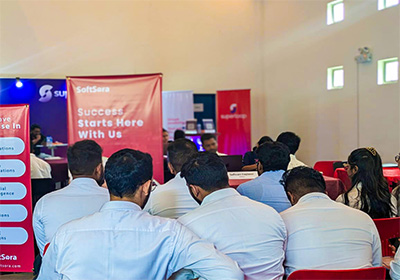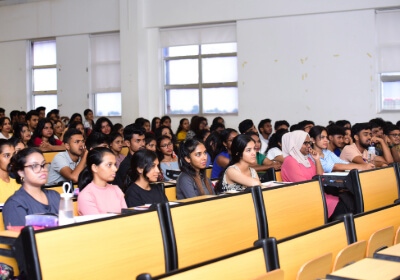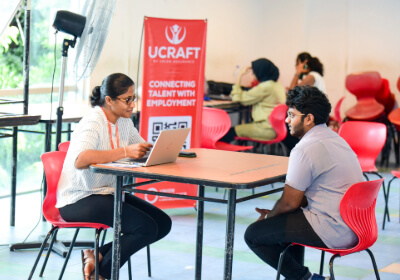The SLIIT Career Guidance Unit is geared to provide SLIIT undergraduates with an enhanced understanding of career options and industry-required technical and non-technical skills, as well as available employment opportunities. We seek to empower our students with the knowledge and know-how needed to balance their academic and extracurricular activities, achieve their career aspirations, through a range of course-specific events, workshops and services.

| Faculty | Internship semester/ year | Internship (Calendar month) | Expected Graduation for outgoing batches |
| Business* | 3rd year 1st semester onwards | Jan–June and June-Dec | Feb/March - Main
Aug/Sept - mini |
| Computing* | 3rd year 2nd semester onwards | July – Dec (6 months) | |
| Engineering | 2nd semester 2nd Semester | Nov – Jan (3 months) | |
| 3rd year 2nd semester | Nov – Jan (3 months) |
* Both faculties support 2 batches per academic year and also provide the option of transferring into the weekend study program to facilitate longer internship periods
SLIT recognises that establishing early contact with working environments is a key component of the students' education and professional development. The Industrial Training Unit was launched with the goal of industry training (internships). SLIT maintains strong connections with government authorities and private sector organisations (e.g. Pearson, Virtusa, and WSO2) and takes advantage of these relationships to set up different industrial training and placement opportunities for students.
Aside from providing students with professional prospects and hands-on experience in their relevant fields, companies, in turn, are able to approach a large number of students in-house for their employment needs. Additionally, they can also harness and cultivate novel ideas for their own projects as a result.
The following companies have in-house industry training facilities at SUIT:
A non-GPA module named 'Industrial Training' has been introduced for the BSc Honours Degree in rr to stress the importance of industry experience.
The assigned 8 - course credits are met by undergoing a recommended period of 6 months training in the industry. While this module has been made mandatory for the Software Engineering specialisation, it is also recommended for other specialisations.
Allows students to develop soft skills together with technical exposure.
SLIIT’s study program and their curriculum are developed together with SLIITs Industry partners and collaborators and therefore, industries engage with SLIIT student activities by contributing their knowledge and resources in many ways.
 Read more +
January 28, 2025 By Vidwan Wakeela in Blog, Career Guidance Counseling Unit Events
Read more +
January 28, 2025 By Vidwan Wakeela in Blog, Career Guidance Counseling Unit Events
 Read more +
August 2, 2024 By Vidwan Wakeela in Blog, Business News, Career Guidance Counseling Unit Events
Read more +
August 2, 2024 By Vidwan Wakeela in Blog, Business News, Career Guidance Counseling Unit Events
 Read more +
July 16, 2024 By Vidwan Wakeela in Blog, Career Guidance Counseling Unit Events, School Reach Programs
Read more +
July 16, 2024 By Vidwan Wakeela in Blog, Career Guidance Counseling Unit Events, School Reach Programs
 Read more +
July 15, 2024 By Vidwan Wakeela in Blog, Career Guidance Counseling Unit Events, Career Guidance Counseling Unit News, Career Guidance Counseling Unit Past Events
Read more +
July 15, 2024 By Vidwan Wakeela in Blog, Career Guidance Counseling Unit Events, Career Guidance Counseling Unit News, Career Guidance Counseling Unit Past Events
 Read more +
May 22, 2024 By Thushara Priyankara in Blog, Career Guidance Counseling Unit Events, Career Guidance Counseling Unit News
Read more +
May 22, 2024 By Thushara Priyankara in Blog, Career Guidance Counseling Unit Events, Career Guidance Counseling Unit News
 Read more +
March 2, 2024 By Thushara Priyankara in Blog, Career Guidance Counseling Unit Events, Events
Read more +
March 2, 2024 By Thushara Priyankara in Blog, Career Guidance Counseling Unit Events, Events
 Read more +
July 8, 2023 By Thushara Priyankara in Blog, Career Guidance Counseling Unit Events, Career Guidance Counseling Unit Past Events, Events
Read more +
July 8, 2023 By Thushara Priyankara in Blog, Career Guidance Counseling Unit Events, Career Guidance Counseling Unit Past Events, Events
 Read more +
April 25, 2023 By Thushara Priyankara in Blog, Career Guidance Counseling Unit Events, Career Guidance Counseling Unit News, Events
Read more +
April 25, 2023 By Thushara Priyankara in Blog, Career Guidance Counseling Unit Events, Career Guidance Counseling Unit News, Events
 Read more +
May 19, 2022 By Thushara Priyankara in Blog, Career Guidance Counseling Unit Events, Career Guidance Counseling Unit News, Career Guidance Counseling Unit Upcoming Events
Read more +
May 19, 2022 By Thushara Priyankara in Blog, Career Guidance Counseling Unit Events, Career Guidance Counseling Unit News, Career Guidance Counseling Unit Upcoming Events
 Read more +
February 2, 2022 By Thushara Priyankara in Blog, Build-up Wednesday, Career Guidance Counseling Unit Events, Career Guidance Counseling Unit Past Events
Read more +
February 2, 2022 By Thushara Priyankara in Blog, Build-up Wednesday, Career Guidance Counseling Unit Events, Career Guidance Counseling Unit Past Events
